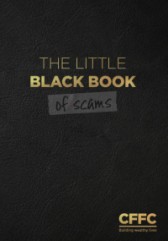|
New Zealanders have a new weapon in their defence against scammers – a booklet detailing different types of scams, how to avoid falling for them, and what to do if you’re caught. The Little Black Book of Scams has been produced by the Commission for Financial Capability (CFFC) and released during its annual Sorted Money Week campaign this week. It is the first New Zealand edition following the release of a similar booklet in Australia. |

|
The CFFC’s Fraud Education Manager, Bronwyn Groot (below), says scams are sophisticated, constantly changing and causing devastating losses to New Zealanders.
“We needed a resource that people could download to read and share to help everyone raise awareness about the different types of fraud. This booklet could be given to friends or family members or distributed among community groups.”
Kiwis’ financial loss through fraud is increasing. Netsafe reported $10 million lost last year, and that figure was exceeded in the first quarter of this year. Most scams go unreported, and Netsafe estimates New Zealand may be losing up to $500 million each year to cybercrime and scams run through the email, phone calls, text, mail and door knocks.
The Little Black Book of Scams outlines how scammers target their victims and trick them into parting with their money, gives tips on how people can protect themselves, points out the ‘red flags’ that give away a scam, what to do if you’ve fallen for one, and the various agencies to which you can report different types of scams.
|
“I’m contacted every week by people who have been caught out by a new type of scam,” says Groot. “There’s currently a Malaysian travel fraud that’s reared its head again following a seizure of fake brochures by police and NZ Post in 2016.” Glossy Malaysian travel brochures are turning up again in people’s mailboxes, luring recipients to websites where they enter a fake competition with the promise of $200,000 in prizemoney. People are then advised to pay various membership fees and taxes – Groot knows of cases of people transferring $15,000-$20,000 before realising they are caught up in a scam. |

|
"Scammers’ methods are becoming increasingly sophisticated and harder to spot - anyone can fall for them. One of our aims is to shift the blame from the victims to the scammers,” says Groot.
The CFFC booklet can be read and downloaded for free from this website. People can order up to 50 print copies for free to distribute to friends, family and through their community or organisation.
The CFFC is a government agency tasked with helping raising the financial capability of New Zealanders. Sorted Money Week is its annual campaign to encourage New Zealanders to think about where they’re at with their money, and get sorted if need be. This year’s theme is financial resilience.
“Protecting ourselves from losing our hard earned money to unscrupulous scammers is part of financial resilience,” says Groot. “Knowledge is power, and we hope this booklet will spread the knowledge of how to stay financially safe.”
Click here to read and download The Little Black Book of Scams
Click here for more about Money Week
What is Sorted Money Week?
Sorted’s annual Money Week this year runs from September 3-9. Money Week is an annual, national campaign, now in its seventh year, run by the Commission for Financial Capability to encourage New Zealanders to think about where they’re at with their money, and get sorted if need be.
The 2018 theme is ‘Weather Life’s Storms’, focusing on three key things people can do to get through unexpected financial hits, be it a dentist’s bill, car repairs or the death of a loved one:
• A buffer savings account – save a little each week to create an emergency savings account for unexpected bills, and avoid going into debt.
• Insurance – consider what kind of loss would hurt you financially, what you could absorb and what would be better covered by an insurance company.
• A will – half of New Zealanders do not have one, yet leaving your family without a will can create all sorts of unforeseen problems, including financial issues for your loved ones.
For more info visit moneyweek.org.nz